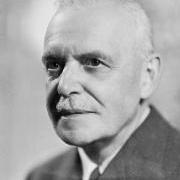 To date, Louis S. St-Laurent is the only Canadian Prime Minister born in the Eastern Townships. His life began in Compton in 1882. St-Laurent's parents, a French Canadian father and an Irish mother, ran a general store and were of modest means. St-Laurent, who grew up fluently bilingual, studied at College St-Charles in Sherbrooke, and Laval University in Quebec City. He received his law degree in 1905 and embarked on a brilliant career. In 1914, he became professor of law at Laval. Capable in both corporate and constitutional law, he served as president of the Canadian Bar Association in the 1930s. From 1937 to 1940, he was a counsel on the Royal Commission on Dominion-Provincial Relations.
To date, Louis S. St-Laurent is the only Canadian Prime Minister born in the Eastern Townships. His life began in Compton in 1882. St-Laurent's parents, a French Canadian father and an Irish mother, ran a general store and were of modest means. St-Laurent, who grew up fluently bilingual, studied at College St-Charles in Sherbrooke, and Laval University in Quebec City. He received his law degree in 1905 and embarked on a brilliant career. In 1914, he became professor of law at Laval. Capable in both corporate and constitutional law, he served as president of the Canadian Bar Association in the 1930s. From 1937 to 1940, he was a counsel on the Royal Commission on Dominion-Provincial Relations.
St-Laurent's family had been involved with the Liberal party for many years. His father had even run as a Liberal candidate in the provincial elections, and it was through him that his son Louis met Wilfrid Laurier on the campaign trail in 1896. Though his family was staunchly Liberal, Louis St-Laurent had no desire to enter politics. In fact, he only did so reluctantly and late in life. When Prime Minister Mackenzie King asked him to accept a Cabinet post (Minister of Justice and Attorney General) in 1941, he had no political experience at all. Nevertheless, he accepted the offer, and was elected MP for Quebec-Est the following year.
During the conscription crisis of 1944, St-Laurent staunchly supported the Prime Minister. After the War, King rewarded him by naming him Secretary of State for Foreign Affairs. In his new post, St-Laurent represented Canada forcefully, and promoted the country's membership in NATO. In 1948, at the age of 66, he was chosen to succeed the aging Mackenzie King as Prime Minister. He would serve in that capacity until 1957. After a brief time as Leader of the Opposition, he returned to his law practice in Quebec. He died in 1973.
As Prime Minister, St-Laurent is remembered as a patriotic man with a keen intellect. Like his predecessor, Sir Wilfrid Laurier, he was deeply concerned with Canadian unity. He saw the country as a "partnership of two great races... planned by men of vision [and] of tolerance." His kindly appearance earned him the nickname "Uncle Louis." His achievements include: paying off the country's wartime debts, equalizing payments to the provinces, reforming the social safety net, starting the St. Lawrence Seaway, creating the Canada Council, joining NATO, participating in the Korean War, passing the Trans-Canada Highway Act, welcoming Newfoundland into Confederation, and presiding over a general period of economic prosperity.